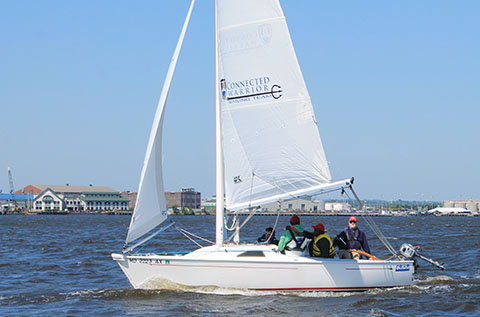Making boating more accessible
Local organization seeks to develop adaptive boating center in Annapolis
Paul Bollinger makes a compelling case Annapolis needs a boating center that’s accessible for people with disabilities.
Bollinger, executive director of Chesapeake Region Accessible Boating, presented his plan for an adaptive boating center during a meeting with The Capital’seditorial board Thursday.
He said CRAB has signed a letter of intent to buy an existing marina on Back Creek. He would not disclose the name of the marina but noted it was accessed from Edgewood Road.
CRAB hopes the sale of the marina will be done by the end of the year, but Bollinger acknowledged there are hurdles. Money is the primary issue as the purchase price of the marina is approximately $2.5 million pending an appraisal.
Bollinger has put together funding that relies heavily on government funds. A big hurdle was cleared recently when a bond bill valued at up to $500,000 was introduced in both chambers of the General Assembly.
State Sen. John Astle, a Democrat from District 30, filed the Senate bill on Jan. 24. The bill requires that CRAB come up with matching funds.
Del. Herb McMillan, R-District 30A, confirmed Thursday he is planning to cross-file the same bill in the House of Delegates.
Another significant source of money for the marina would come from Program Open Space funds, which flow from the state of Maryland to Anne Arundel County. Gov. Larry Hogan has already fully funded Program Open Space and allocated $2.4 million to the county, according to Bollinger.
Bollinger has been busy lobbying all three levels of government about the proposed adaptive boating center.
“We have the full support of every elected official from the governor’s office on down. We’re looking to turn all this political support into commitment,” Bollinger said. “Bottom line, we need to get the state of Maryland, Anne Arundel County and city of Annapolis to all be onboard and appropriate funds.”
Ultimately, any Program Open Space money would flow through the Anne Arundel County Department of Recreation and Parks, and Bollinger said he has been working with that agency for more than a year.
Recreation and Parks Director Rick Anthony said he would discuss with County Executive Steve Schuh the prospect of providing money for the center.
“We are certainly supportive of Mr. Bollinger’s efforts and are trying to identify opportunities that line up with the county executive’s initiatives for public water access,” Anthony said.
Schuh had asked the Recreation and Parks department to address the lack of publicly accessible boat ramps in the county. Anthony has also been approached by paddlers and the rowing community about finding public locations to launch.
“We have been unable to identify a site that works for all the various constituencies,” Anthony said. “We are now very aware of the adaptive boating issue and will work to address their needs as well.”
Anthony said the department has a water access account and boat ramp account as part of its capital budget.
Annapolis Mayor Gavin Buckley also expressed support for the general concept of an adaptive boating center.
“We should absolutely have accessibility at City Dock, which can be tied into a facility such as this on Back Creek,” Buckley said Thursday. “It’s early on in the game, but we support the basic concept.”
Chesapeake Region Accessible Boating was founded in 1991 by Don Backe, who served as executive director until his death in 2013. For 27 years, the nonprofit has operated out of Sandy Point State Park, using a fleet of six sailboats to provide a recreational outlet and therapeutic value to persons with disabilities.
Over the years, CRAB has expanded its outreach program to offer two-day clinics to organizations looking to offer members the opportunity to learn more about sailing from the basics to racing.
Bollinger said many of those clinics have been conducted for youngsters from underprivileged backgrounds. For example, CRAB works with the Anne Arundel County and Annapolis city police departments to host sailing camps with at-risk youths.
CRAB has also worked with the National Sailing Hall of Fame to organize the annual Recovering Warrior Sailing Regatta, which is held at City Dock in conjunction with the U.S. Sailboat Show.
Sandy Point State Park has become increasingly less viable as a venue for CRAB because its constituency has trouble getting there. On summer weekends, Sandy Point sells out and closes as a result. Additionally, beach traffic at the Bay Bridge makes the park difficult to access.
Also, CRAB operates out of one 80-foot pier at Sandy Point that limits the boats that can be berthed. Bollinger said that pier can accommodate the six sailboats owned by CRAB, which prevents the organization from growing its fleet.
“We have plans to purchase a pontoon boat that would be an ideal platform for persons with disabilities to go fishing or just get out on the bay, but we have nowhere to put it,” he said. “We need more dock space in order to add more boats and therefore serve more people.”
Bollinger said having its own marina would also enable CRAB to provide canoeing and kayaking opportunities for disabled individuals.
twitter.com/BWagner_CapGaz

